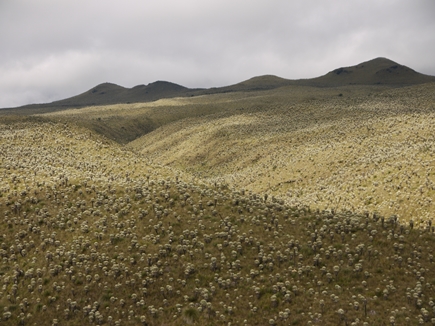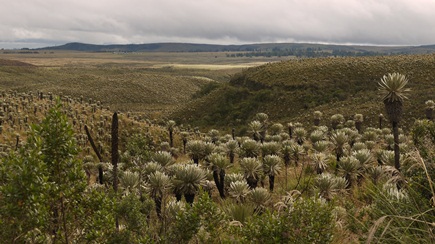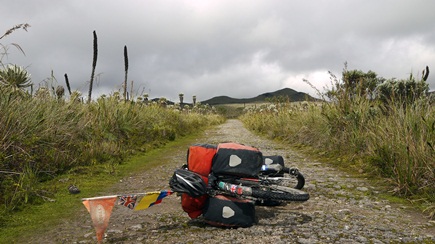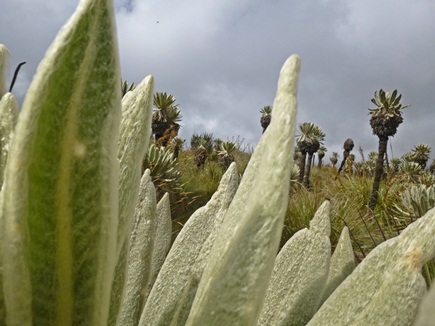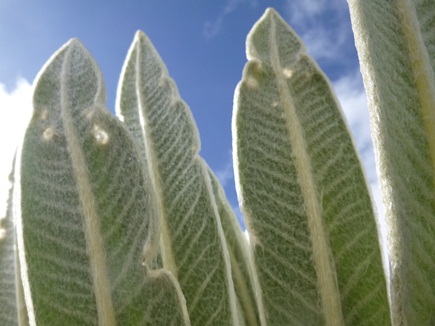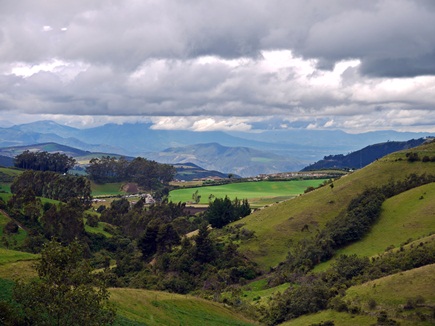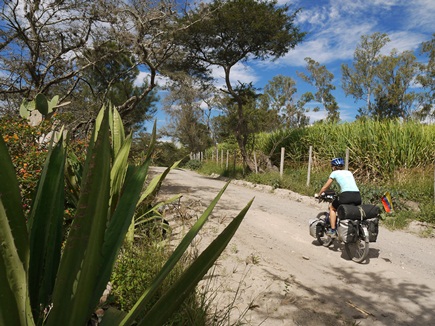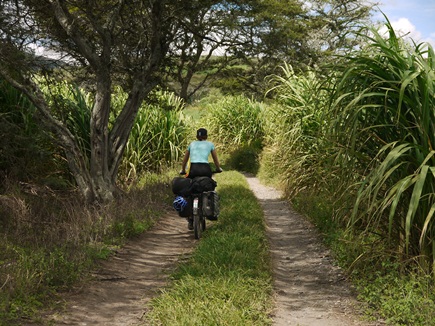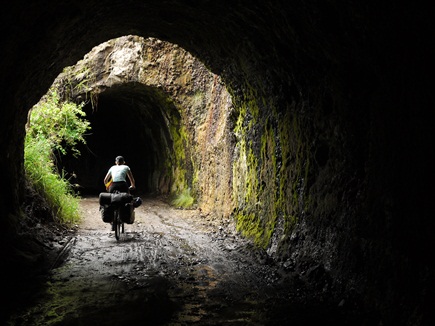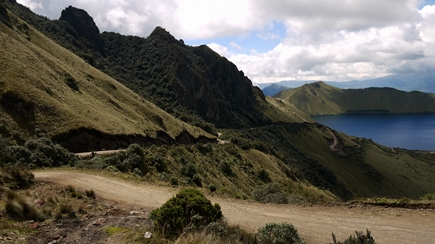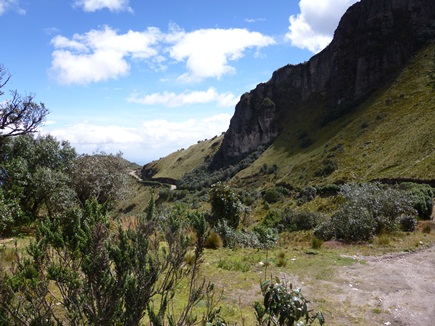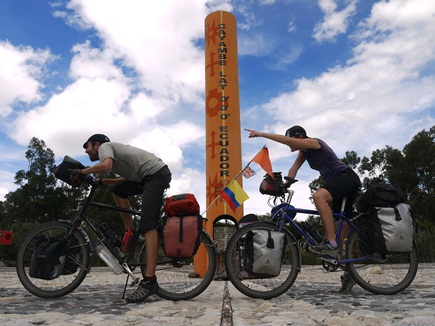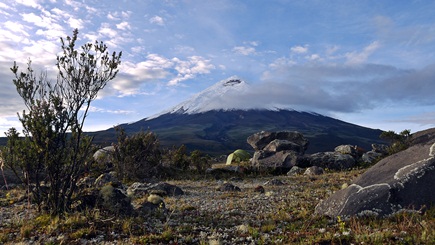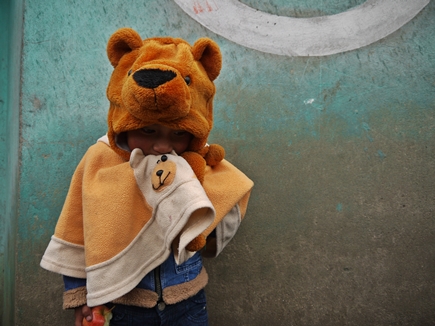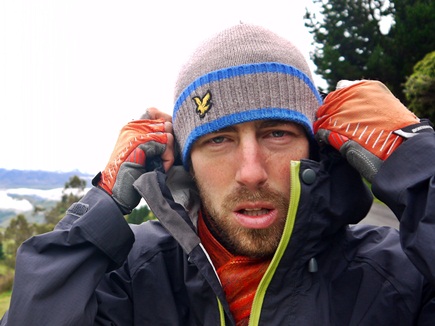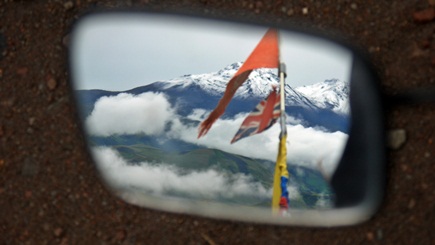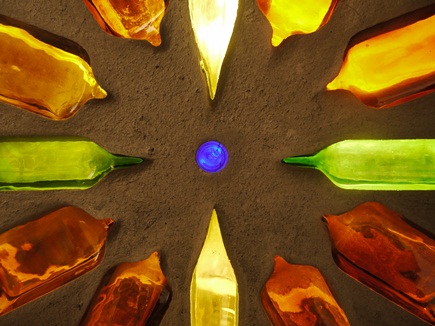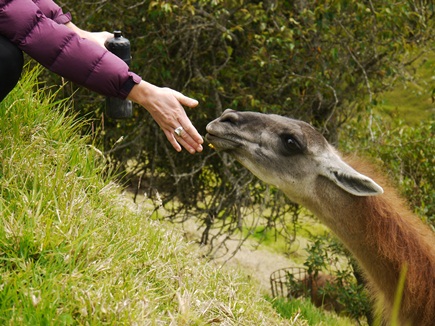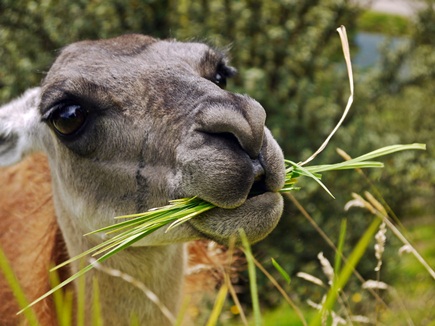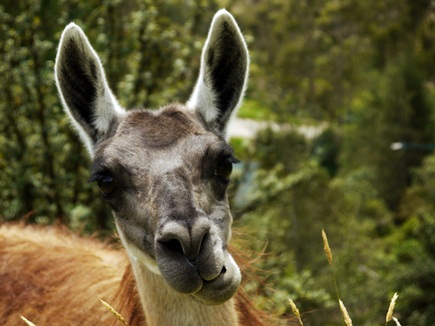Riding El Trampolín: Mocoa to Ecuador
March 2nd, 2013
It seems that my camera memory card has become a fairly reliable barometer of how much I’ve enjoyed a ride on this trip. A full memory card usually means I’ve been inspired – invariably by exploring back roads, discovering small villages and towns and meeting lots of locals. If however all I find are a few dutiful but lame snaps of us standing in front of something vaguely touristy, then chances are we’ve relapsed (or occasionally been forced) into “destination” riding mode: busy highways, big towns and minimal human interaction.
By this theory, my near-empty memory card would suggest that much of our southerly Colombian leg from Valle de Cocora down to Mocoa fell into the second category – or “auto-pilot” as I’ve come to call it. It’s not that didn’t have its moments: the stunning walk to visit the tombs at Tierradentro; a night spent with a wonderful campesino family high up on the Páramo de las Delicias; and the impressive statues of San Agustín were all highlights. Yet it just didn’t quite inspire us in the way that most of our riding in Colombia up until then had.
Firstly I think we chose our route badly, opting to head south through the Cauca Valley instead of crossing towards the Magdalena through the Nevados del Ruiz. You’d think that we’d have learned by now that although valleys and coastal plains might mean flat and fast, for us they also usually mean hot and tedious.
Then we managed to time our passage through the departments of Cauca and Valle del Cauca just as the FARC were dusting off their guns from the Christmas ceasefire, and things got caliente (“hot”) in the very Colombian sense of the word. The minor road that we were planning to take through the foothills to avoid Cali suddenly became a focus for FARC activity. Then the alternative route took us towards Puerto Tejada, a town where cars were stopping in the road to tell us that we were “guaranteed” to be robbed, and we eventually succumbed to a 30km police escort. We didn’t feel at risk at any point – especially by the FARC action which was all targeted at the police and military – but it did represent a distinct change of atmosphere from the carefree riding we’d enjoyed further north.
Perhaps it was also just because we could sense the end of our time in Colombia finally closing in on us. I guess after six months in this captivating country, an anti-climax of sorts was inevitable. But I think as much as anything it was because – in our heads at least – the last few weeks have felt like they were just leading up to this famous road from Mocoa to Pasto.
Nicknamed El Trampolín de la muerte (“The Trampoline of Death”) because of the regularity with which bus and car drivers seem to manage to drive over its precipitous drops, it is equally famed in cycling circles as a tough but essential part of the Colombian touring experience. Fortunately for us, the Trampolín lived up to its hype, restoring our enthusiasm for the road and filling that empty camera memory card.
Over the course of just 155km we pedalled from the steamy edge of the Amazon up to the misty páramo of the high Andes. It felt like a fitting end to our Colombian experience, encapsulating in just a few days the incredible variety and contrasts of this wonderful country.
James
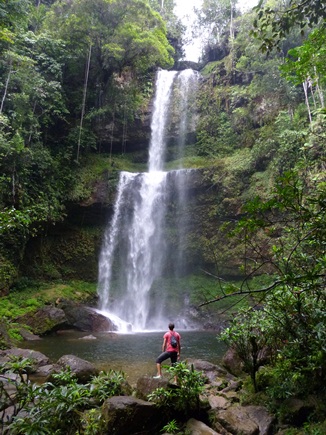
Before setting out from Mocoa, we spent a couple of days camped out with the monkeys and toucans in the garden of the friendly Casa del Río hostel. In between the rain, we found a way through the mud up to the spectacular Hornoyaco waterfall…
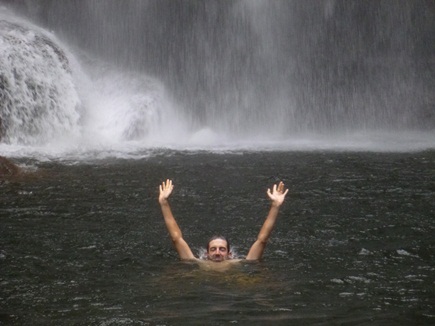
…where we didn’t need much persuasion to dive in and enjoy the best power shower I think we’ll ever have.
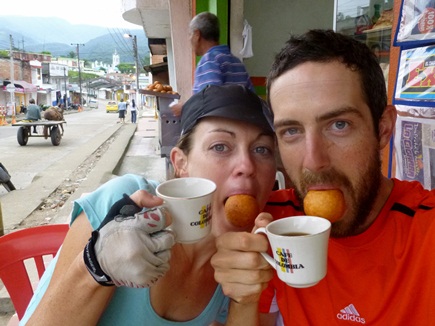
We set out early from Mocoa with the best of intentions – at least until I spot these buñuelos by the road. If six months in Colombia have taught me anything, it’s that cold, old buñuelos are best avoided – but fresh, hot ones like these are not to be missed. Cue a second breakfast – we might need the extra calories, I reason…
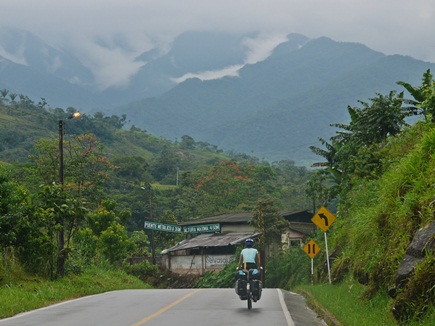
The first 15km out of Mocoa are paved and smooth, with only the looming mountains in the distance giving a hint of what’s to come…
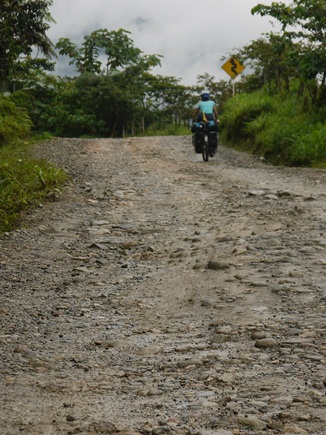
…but soon the pavement ends and the dirt begins, winding its way gradually up into the forest. The gradient is steady at least, and the surface good – better in fact that many of the other dirt roads we’ve ridden elsewhere in Colombia.
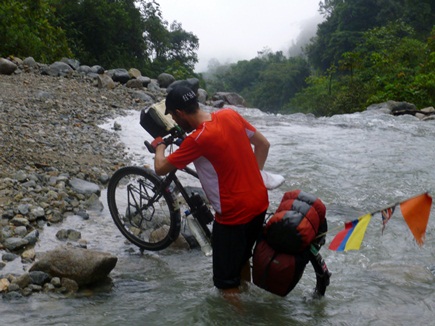
After numerous rodent attacks in the US, the undersides of my front panniers now resemble colanders; they gave up being waterproof a long time ago. This calls for some lifting over the numerous streams to try and at least keep some kit dry.
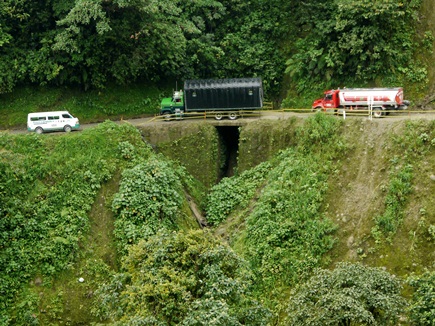
Despite being single lane in many places, this is the main route between the departments of Putumayo and Nariño, and so sees a fair amount of traffic. This leads to some interesting reversing manoeuvres…
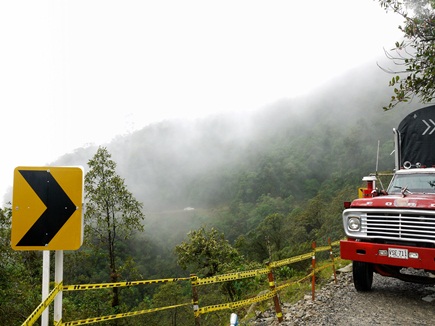
…and calls for some precision steering on the curves. Unfortunately, not everyone quite makes the bend…
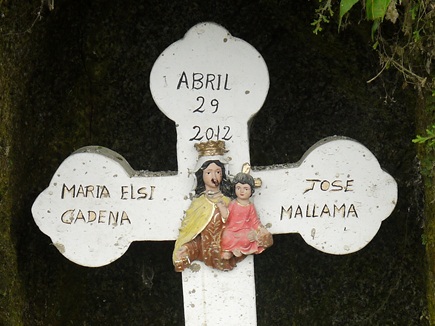
…as the roadside shrines attest – this one from just last year.
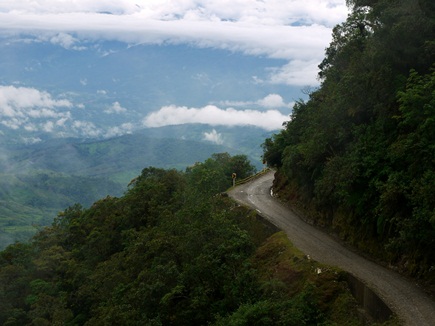
A few glimpses of where we had come from below, and then the clouds and mist roll in and unleash a vicious rainstorm, drenching us. This is where the climb really helps – keep pedalling, and you will keep warm.
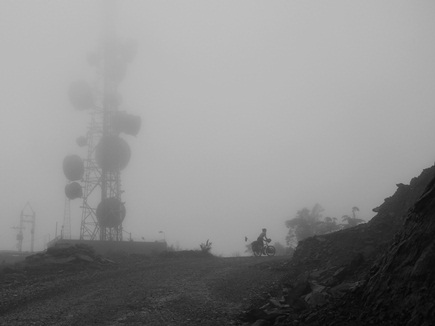
You know you’re getting near a pass when the communication towers appear, looming ominously out of the mist…
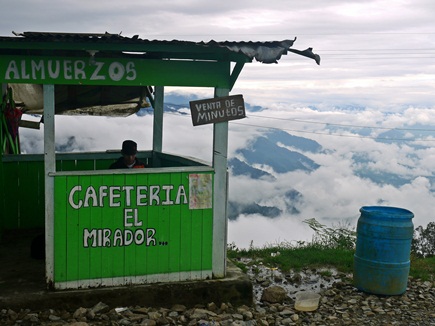
…and sure enough we emerge out of the clouds at a mirador, complete with police station and a huddle of cafés. We order soup to warm up, and a few minutes later our new cycling friends Mike and Karen arrive – they started in Canada back in 2011 and we had camped together in Mocoa.
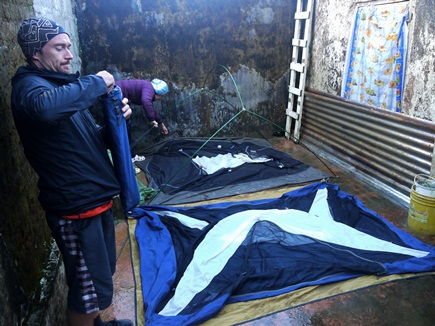
It’s still early and we have only come 35km, but we are cold and wet, and the police tell us we will struggle to find anywhere flat to camp until much further ahead. The friendly café owner offers to clear a deserted building for us to camp in. We don’t need much persuading, and squeeze in the tents.
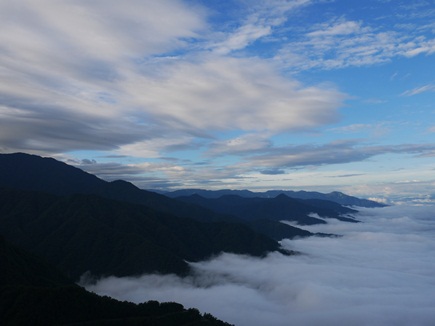
Late afternoon reveals an incredible view from our perch: a duvet of cotton clouds nestled over the Amazon, nudging against the edge of the Cordillera Central. We make friends in the little community of police, cafe owners and roadworkers. The police tell us how in 2002 this zone was home to some fierce fighting – apparently the guerrillas managed to blow up the police station three times. I spend much of the evening translating Adele’s “Someone like you” into Spanish at the request of one of the roadworkers – all good practice…
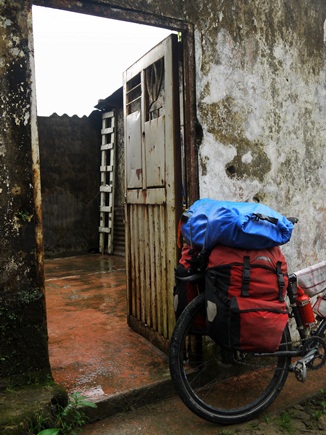
After a good night’s sleep, tents are packed and bikes ready to roll.
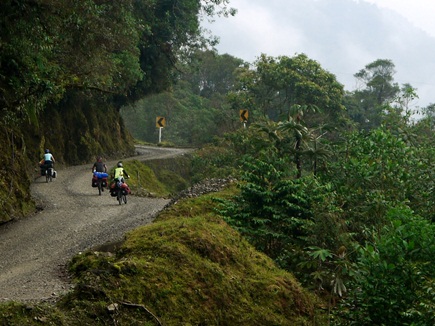
Our new foursome sets off…
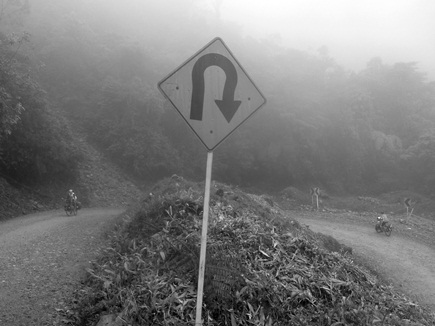
…around steep hairpins as the mist closes in again.
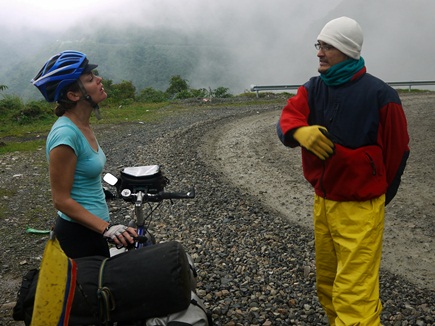
A local on a motorbike stops for a chat – note the slight difference of clothing between cyclist and motorcyclist. It turns out he is a cyclist too, and – as so many times before in Colombia – he passes us his contact details, making us promise that we will come and stay with him next time we are here.
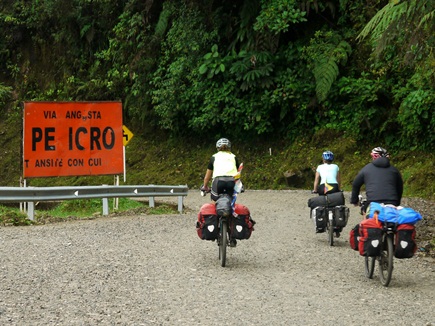
A brief downhill respite, past danger signs helpfully warning us that the road is narrow (just in case we hadn’t noticed), into gullies…
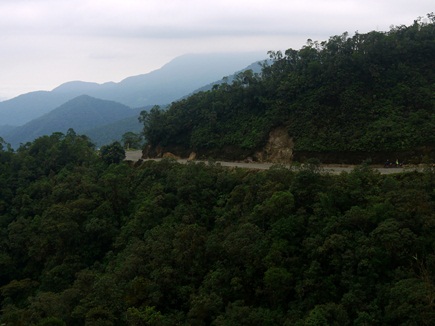
..and along narrow ledges. Spot the cyclists!
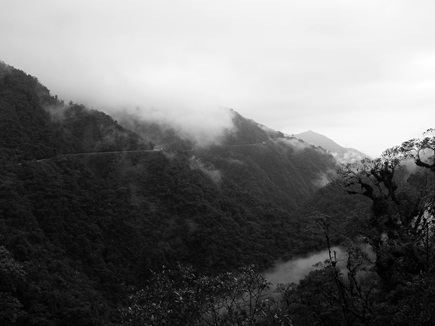
Photos just don’t do it justice, but this section of road is truly breathtaking, clinging to the side of the mountain through seemingly untouched cloud forest. A long, steep climb which seems to go on forever…
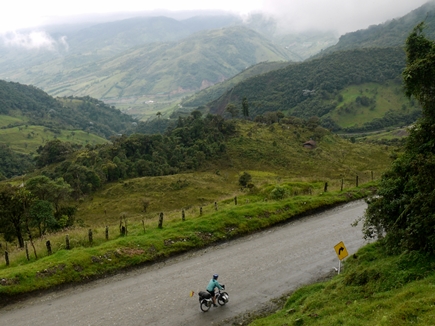
…before finally sweeping down towards the Valley of Sibundoy. Clearly sensing our elated mood, this is when a rogue dog decides to jump out and give Bedders a nasty bite on her leg – our second dog bite of the trip after my encounter in Costa Rica.
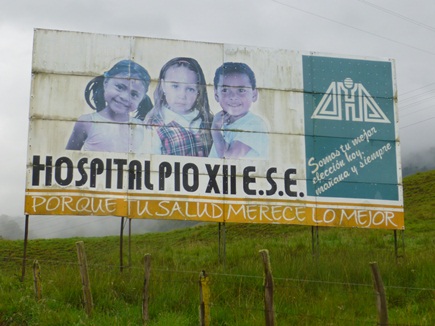
Fortunately we both had our initial Rabies shots before we left home, and so we just need to find someone who can give us the two booster jabs and a course of antibiotics. We get lucky – the local hospital in Colón has the vaccine and even better, won’t charge us.
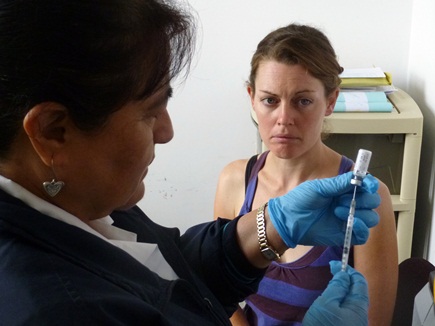
And so we leave Karen and Mike to continue towards Pasto, while Sarah heads for the hospital with some trepidation…
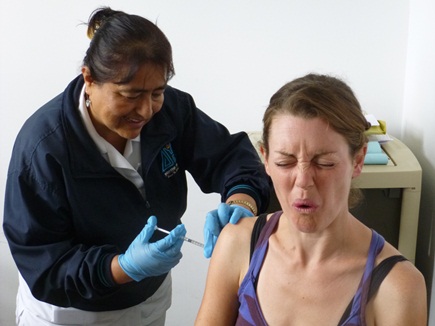
…where the jab is delivered with a typically Colombian smile from Ruby the nurse, and received with an impressive grimace from Sarah. Thank you Ruby for your help!
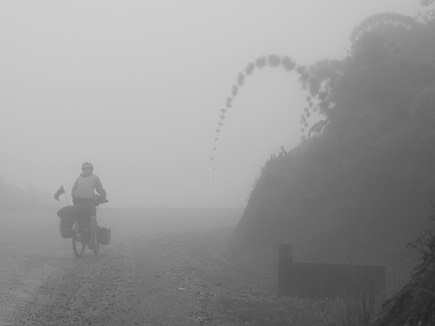
The next morning we decide to ride on towards Pasto, from where we’ll be able to catch a bus back to Colón in a few days time for Sarah’s second jab. It’s a tough climb out of the Sibundoy Valley through the rain, with only overhanging triffid-like plants hinting at the páramo beyond the mist.
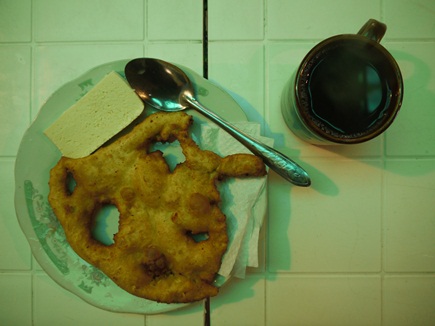
Morning snack: it might not look appetising, but when you’re cold and wet this hojaldra (sweet dough fritter), served with queso (soft cheese)…
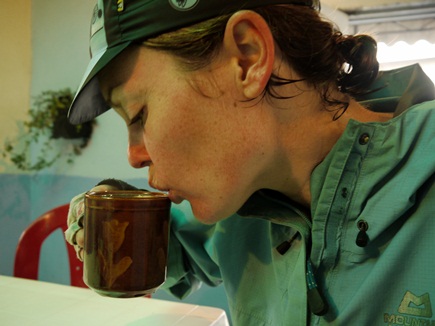
…and steaming agua de panela (hot sugar cane juice) really hits the spot.
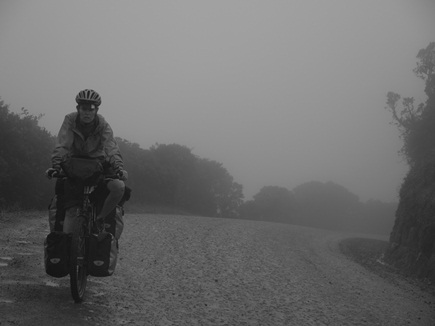
Finally we crest the pass – sadly I was too slow to catch Bedders turning round and making a very rude gesture at the hill behind her as she came over the top – and then it’s downhill…
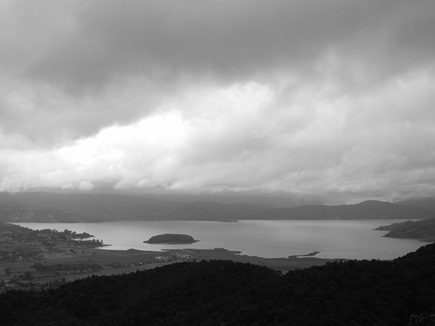
…until the Laguna de la Cocha comes into view, looking suitably moody in the mist.
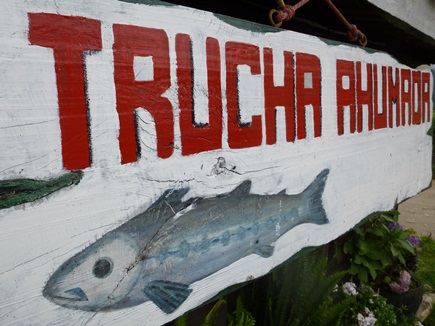
A tip from our Medellín friend Carlos sends us in search of a restaurant called Naturalia…
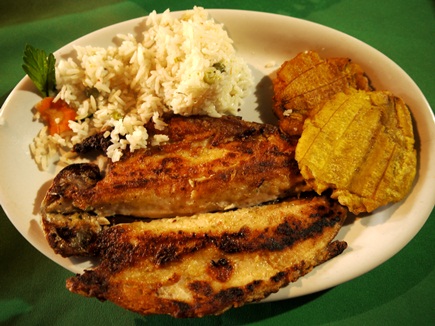
..where we tuck into the local speciality, trucha ahumada (smoked trout). It is truly delicious – by far the best we have eaten in Colombia. Stuffed, we gratefully accept their invitation to set up our tent on their balcony.
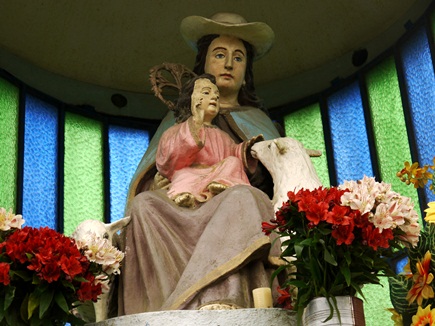
The next morning it’s a short climb up to the pass – guarded by a slightly moody looking Mary in a sombrero – followed by a beautifully long descent into Pasto. The next day we take a vomit-inducing minibus shuttle back to Colón for the second Rabies jab, realising just how grateful we are to be travelling through the Andes on two wheels instead of four.
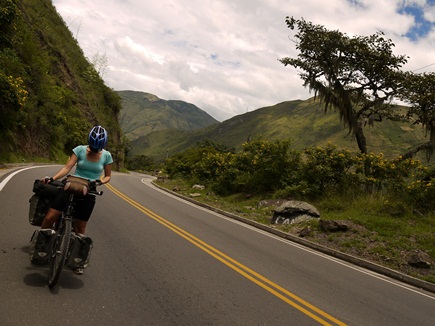
From Pasto, it’s a beautiful rollercoaster ride on the Panamerican towards the border…
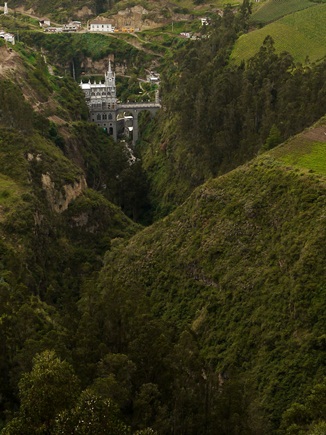
…with just enough time for a detour to visit the sanctuary of Las Lajas, perched dramatically across a ravine outside Ipiales. Our last night in Colombia is spent in a convent with the nuns, emotions whirling at the prospect of leaving a country which after six months has become home to us.
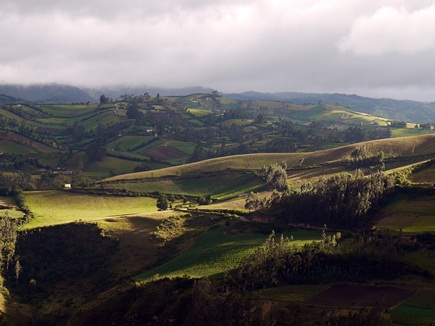
The next morning we cross, and Ecuador awaits – its patchwork fields are at once strange and yet reassuringly familiar, looking for all the world like a high-altitude version of the Yorkshire Dales. You never know, they might even have Yorkshire pudding…
Caras de Colombia
March 5th, 2013
When I sat day-dreaming about this trip at my desk (and indulging myself in far more Pan-Am cycle touring blogs than was probably healthy), it was images of epic landscapes that made up my mind’s picture of what this adventure would be. Stunning photos of cyclists blazing a trail through the endless spruce of the Alaskan wilderness; of tiny specks crawling their way up herculean Andes climbs; and of figures bent double battling their way into the ferocious Patagonian headwinds. These were the landscapes I came for.
Yet the reality has been very different. Not that we haven’t already seen some of those epic landscapes – we have seen plenty, and I’m sure many more await us to the south. But a trip that was supposedly all about the landscapes has instead turned out to be as much – or maybe even more – about the people we have met along the way.
The landscapes provide the backdrop, but it is the thousands of human interactions which burn most strongly in my memory of the last year and a half. Most have been fleeting – a few minutes outside a shop or at a junction; others have invited us into their homes or gardens for the night; some have even welcomed us into their families for days at a time.
And nowhere have the people we have met along the way been more at the forefront of our experience than in Colombia. Partly this is because – as every cycle tourist before us has discovered – of the innate warmth and friendliness of pretty much every Colombian we have met. But it is also because after six months here, Colombia will probably be the country in which we will have spent the most time in the whole trip.
We spent three of those months in Medellín, giving us the first real chance of the trip to put down roots and really connect, beyond the usual twenty questions we face in our roadside encounters. We left Medellín with a group of true friends who I hope we will see again on one side of the world or other. And so, it seems fitting to wrap up our Colombian adventure with just a few of those faces that have made our last six months here so memorable.
James
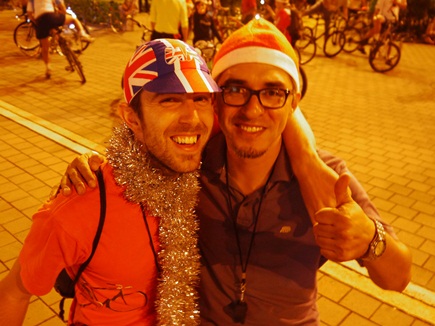
Jorge, aka George: Friend, riding partner and bike promoter extraordinaire. Jorge was the man who encouraged us to come to Medellín, and who welcomed us into his extended cycling family with open arms and a bottomless stomach that matched even mine – from our first bandeja paisa to Tuesday night hamburguesas. Gracias parcero – buena vibra, buena biela y buen Brooks!
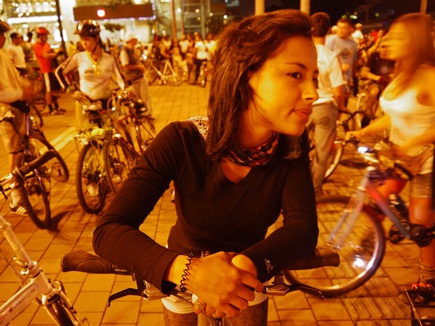
Dorancy, aka La Flaca: Jorge's other half and Sarah's Spanish conversation partner. An endless source of patience in correcting the faux pas of the bumbling English – from Spanish pronunciation to the correct time of day to be eating a buñuelo.
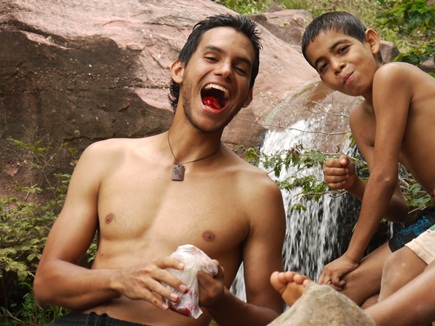
Julian: Julian and his wonderful family initiated us into the world of Colombian hospitality in Bucaramanga. A quick stopover turned into two nights and then three, followed by a beautiful if altitude-curtailed joint visit to El Cocuy National Park.
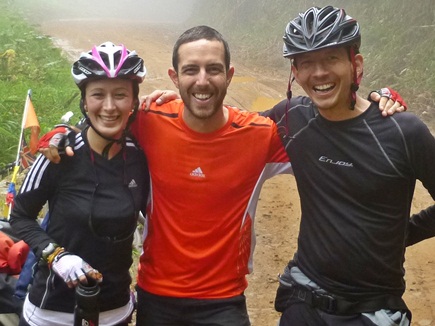
Carlos, aka Caliche: The man who persaudes up to 5,000 cyclists to take to the Wacky Races-esque streets of Medellín every month in the critical-mass inspired Fiestas de la Bici . Carlos is an ever-smiling, ever-charming ball of pedal-powered fun who has himself toured South America by bike and spent hours poring over maps with us, giving us countless tips for the journey south. He also invited us to spend a memorable few days in his beautiful home town of Jardín…
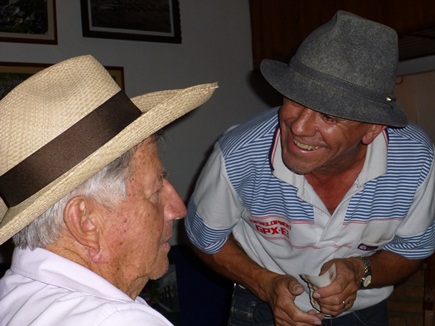
Don Ed and Toto: …including the funniest night we have spent for a long time in the company of his dad, Don Ed(uardo), the owner of their favourite local bar, Toto, and several bottles of Antioquia's finest rum. Over the course of the night – in true Mr Ben style – Toto worked his way through the contents of his very deep fancy-dress cupboard. Suffice to say I will never forget his Colombian interpretation of Rod Stewart.
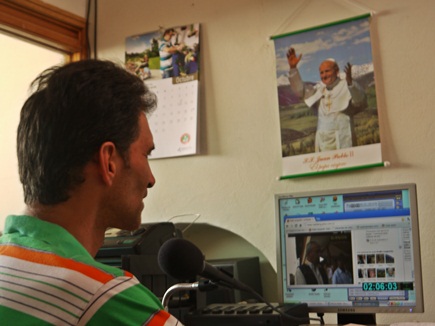
Eduardo: News travels fast in Zapatoca, and so when two gringos on bikes rolled into the village square, local radio presenter Eduardo was there in minutes with his mic and camera. What started as a five minute interview turned into an overnight stay on his finca and a a fantastic ride the next day to Guane with Eduardo and his cycling buddy, Manuel.
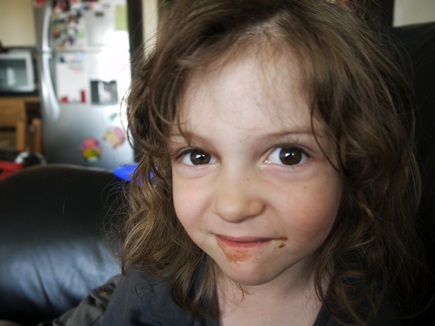
Balti, aka El Monstruo: Husband of a friend of a friend (yes, we are becoming masters of the tenuous connection), Balti and dad Carlos welcomed two tired and malodorous cyclists into their Medellín apartment while we found our feet in the city. Carlos broke our porridge and spaghetti routine with delicious Colombian dishes, while Pony Malta-fuelled Balti kept us on our toes with endless toy car races around the apartment.
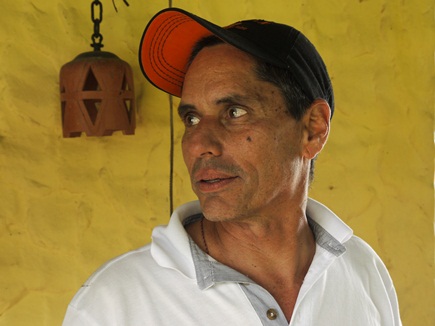
Milo: You'd think good coffee wouldn't be hard to find in Colombia, but sadly most of the good stuff disappears overseas or into exclusive coffee shops before most Colombians get even a sniff of it. Fortunately there are farmers such as Milo, who are leading a drive to create a mainstream culture of high quality coffee within Colombia. We were lucky enough to spend a day on his organic finca outside Medellín, and returned converts. Cafe Los Alpes: the best coffee we've drunk on the whole trip.
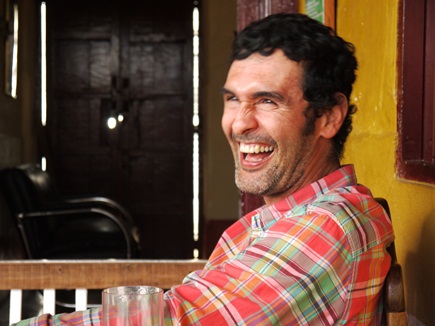
Pacho, aka El Chicharrón Peludo: Dancing around the Christmas natilla, day-dreaming of far-flung bike adventures while sipping Milo's coffee in Kaldi Kaffee, or dropping us on a dirt road climb in south west Antioquia – Pacho and Família López were at the heart of our Medellín experience…
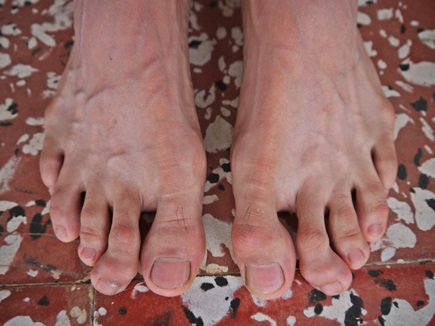
Pacho's feet:…even if his feet did make him look like he'd just stepped out of the lower reaches of the Magdalena.
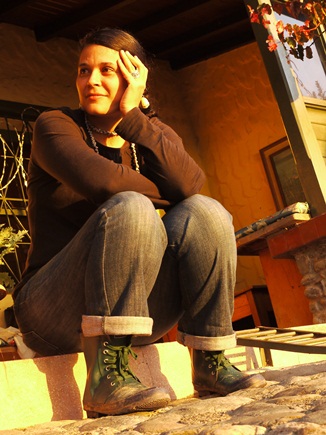
Catalina: Luckily his partner Catalina was always on hand to keep his feet covered, explain the latest double entendre which had left us baffled, and roll her eyes with her trademark “Ayyyyy nooooo, este Pacho!”
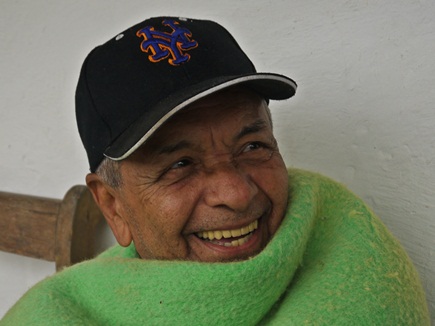
Don Raul: And if you wondered where he gets it from, meet Don Raul – Pacho's dad, and by far the most mischievous 82-year old I have ever met. Us two mugs roll in on bikes with funny accents and, well, let's just say we provided plenty of ammunition. A man whose infectious sense of fun was matched only by…
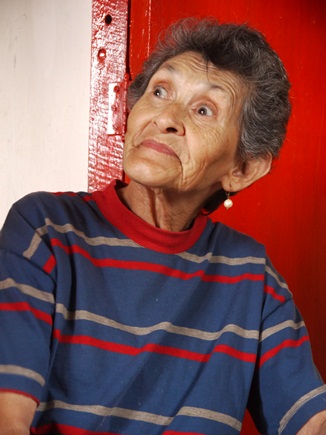
Doña Teresita:…the sweetness of his wife Teresita. A calm and heart-warming presence amidst the boys' banter, she would often suddenly appear beside you and give you an enormous, spontaneous hug. A truly wonderful lady.
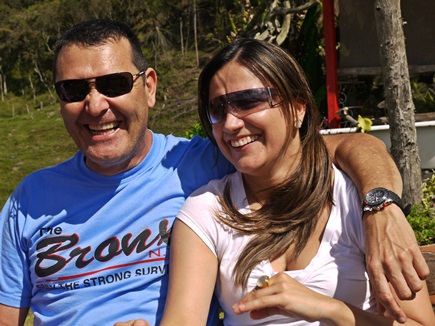
Raul y Lina: For me, no-one embodied the the irresistible Antioquian sense of slapstick humour and fun more than Pacho's brother Raul and his wife Lina. Put it this way – wherever we travelled, they always carried a remote-controlled whoopie cushion (yes, they exist) – and they weren't afraid to use it.
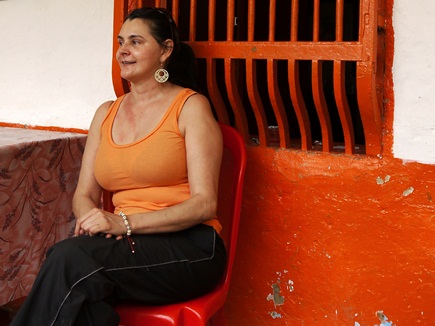
Marta: Pacho and Raul's long-suffering sister who lives in New York, and who we got to know while she was visiting. We took a ride out to the old finca outside Ciudad Bolívar where the kids grew up, where Marta sat in exactly the same chair on the same veranda she used to as a child. A moment full of memories for them, and special for us to watch.
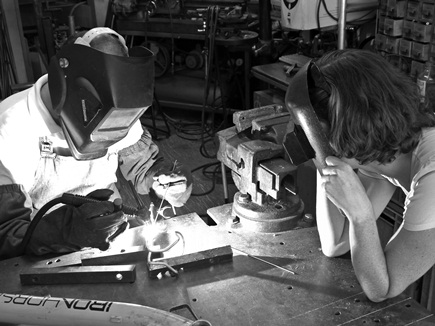
Tinno: “Steel is easy to love, because it loves you back.” So says the maestro of the forgotten art of bike frame building and Colombian legend, Tinno – who we were lucky enough to get to know during our time in Medellín. We loitered around his workshop, learned our first words of parlache (a Medellín slang), rode bikes together in the Oriente, and had our measurements taken just in case. You never know, one day we might find enough money to order our custom made Tinno bikes…
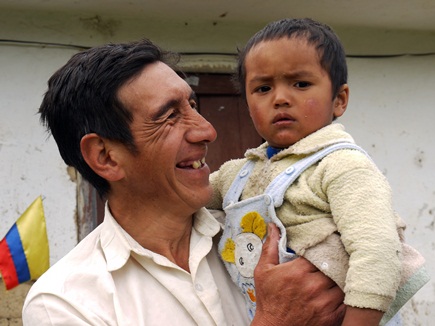
Sebastián y Eliseo: We spent some amazing nights in the Colombian campo, where we experienced warmth and humbling hospitality, from people whose lives are far more precarious than ours will ever be. I'll certainly never forget one night high on the páramo with Eliseo's family, huddled around their wood fire, laughing and sharing experiences of our different countries and cultures…
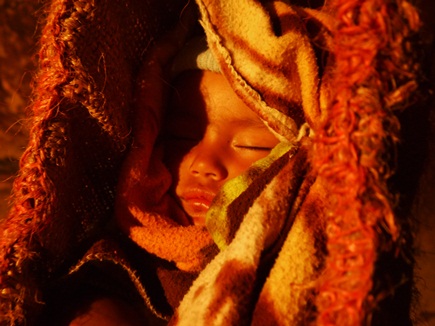
Sebastián:…while their newest-born, Sebastian, slept peacefully in a homemade hammock of knitted coffee sacks.
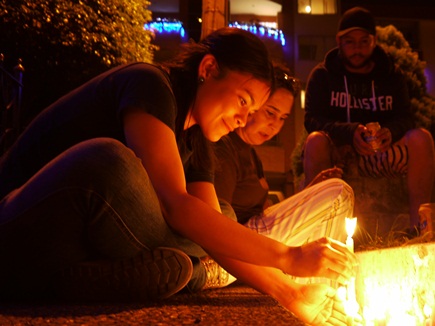
Nora: Our home for 3 months in Medellín, Los Colores was a haven of peace and tranquility. Our neighbours welcomed us like family, our landlady Nora was the perfect hostess, and we were tempted to sneak her pets into a pannier…
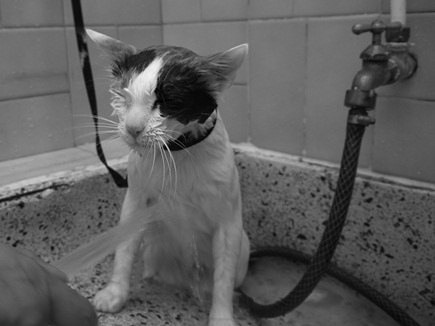
Agata:…none more so than her cat Agata, who definitely ruled the house – except when she was submitted to her fortnightly shampoo and rinse, when she definitely lost some of her cool.
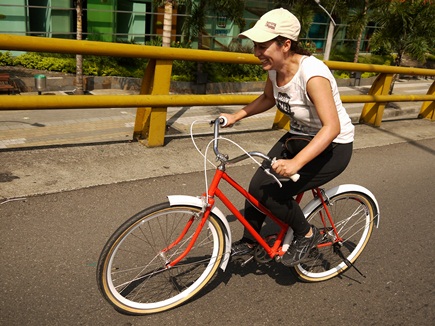
Ana Paulina: The definition of demure, Ana Paulina welcomed us into her wonderful family for Christmas with open arms, amazing fríjoles, world-class chicharrón and slightly too much tequila. Happy memories. We even managed to coax her back onto her long-neglected bike for a Sunday ciclovía.
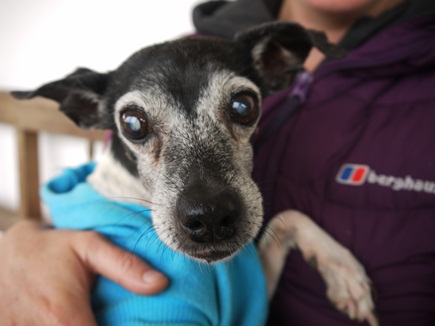
Peluso, aka Tembleke: After Bedders' farewell bite, dogs really shouldn't be on our list of Colombian highlights. However, the cute ones far outnumbered the vicious ones – from Don Mario's pack of 17 to Pacho's troop of six squeezed into the Turpial on the way up to Santa Elena. Peluso – 16 years old, half-blind, skinnier than a touring cyclist and with a constant tremble – stole my heart.
Mitad del mundo
March 12th, 2013
My head full of Colombia as we crossed the border at Tulcán, it was difficult to concentrate on Ecuador and what it might be like. Fit to burst at saying goodbye to a country I had fallen in love with and knowing that it would be a long time before I saw the friends I made there again, it was with some reluctance that I handed my passport over to gain entry into Ecuador.
Thankfully Ecuador had ample distractions waiting for me. We were instantly wooed by three successive days of beautiful dirt riding, and began to discover a wider range of tastier food with more flavour than we had recently enjoyed. The thrill of entering a new country came flooding back. After six months in Colombia, I had felt at home where things had become comfortable, easy. Now in Ecuador with a new currency, a new cuisine, a new backdrop, it was time to start discovering again.
As we got our bearings and adjusted to bigger landscapes with jaw dropping views, another moment grabbed my attention. There was a marker in our journey that I hadn’t really acknowledged, until we arrived right there, on the line…we had reached la mitad del mundo – the Equator. As we slowed to cross the line hand in hand – on bikes we had pedalled all the way from Alaska – I felt quite proud.
I realised that we can say that we have pretty much cycled halfway down the world, clocking up 18,200km in the process. Feeling impressed with that, and happy to be in Ecuador, I took a moment to mark the occasion with a big hug for my ever- patient riding partner, a celebratory munch on a banana (of course) and the obligatory poses for a series of silly photos on top of the line itself at the monument just outside Quito.
Sarah
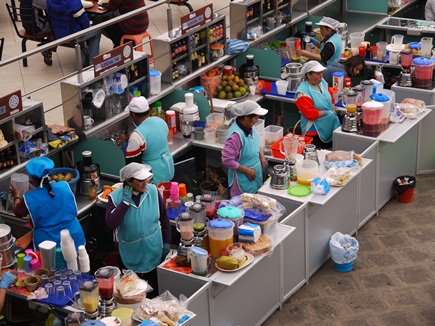
The border town of Tulcán isn't Ecuador's most picturesque place but its newly renovated market with delicious fruit juice stalls, free wi-fi and cheap set lunches were enough to give us pleasant welcome into the country.
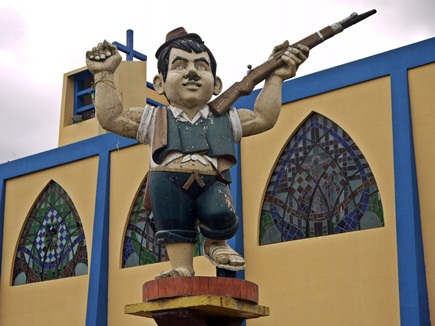
We'd heard from other cyclists of a road leaving Tulcán leading up into the páramo highlands that was found by looking for the statue of a dwarf resembling Hitler, brandishing a rifle outside a modernist church….with such weird and specific instructions we couldn't really go wrong and sure enough, we found the statue and followed our road…
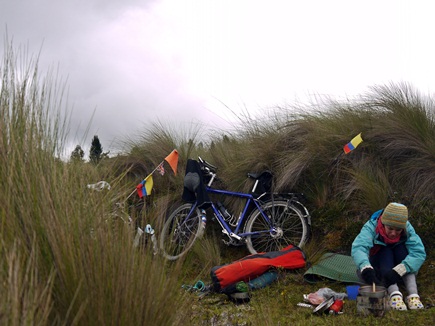
…to a remote camp spot at around 2800m where we dropped the bikes, put on all of our clothes and fired up the stove to make a hot chocolate in an attempt to warm up in Ecuador's cooler climes.
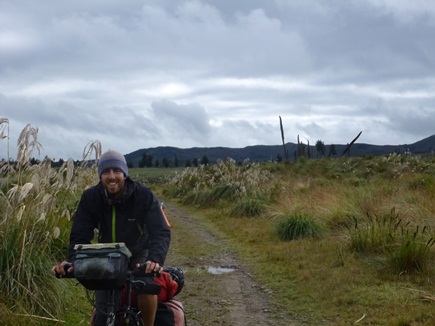
After a night of pure silence, camped under a blanket of crisp, crystal stars we were up early and raring to go across the páramo…
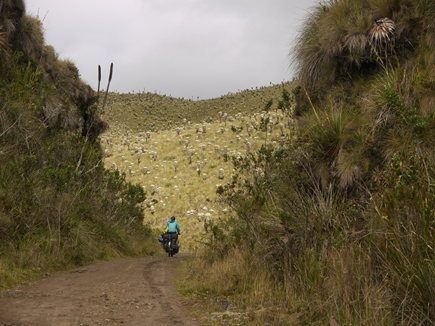
Around every corner these plants, which are only found above 3000m in Venezuela, Colombia and Ecuador, were waiting to welcome us….
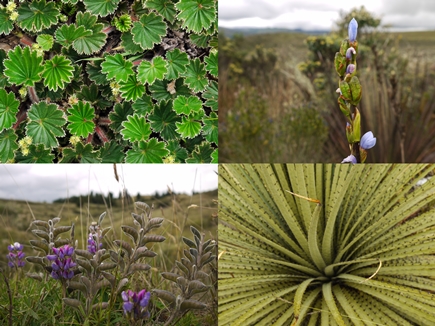
There are other species of plant that thrive here too…delicate colours and textures we were surprised to find in such harsh conditions.
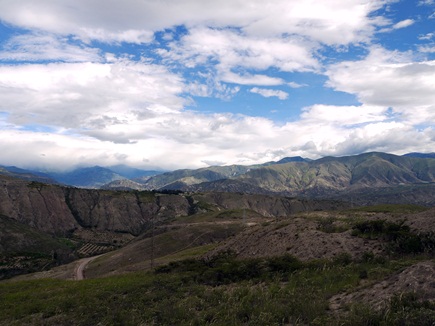
…down and down and into more rugged terrain that reminds us we have truly reached the Andes. Those mountains looming ahead of us today, will be the climbs we have to undertake tomorrow, and the next day, and the next day.
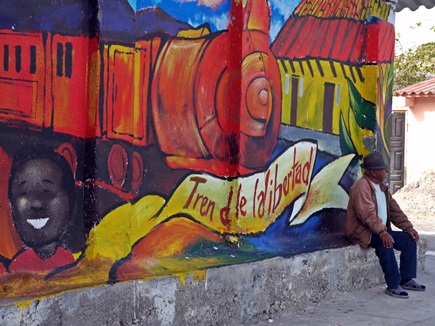
Reaching Salinas, just off the Pan American which we have (smugly) successfully avoided so far, we encounter a sleepy forgotten town on the edge of the mountains…
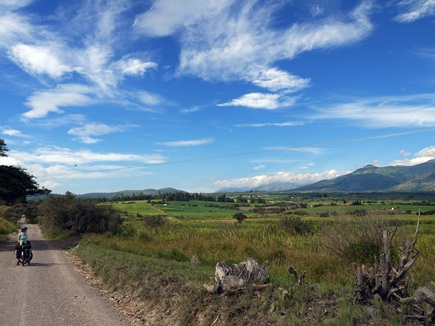
…and on leaving, in another attempt to avoid the main road, we kind of make up a route as we go along. Using Volcano Cotacachi as a landmark, we stumble upon the old route to Ibarra…
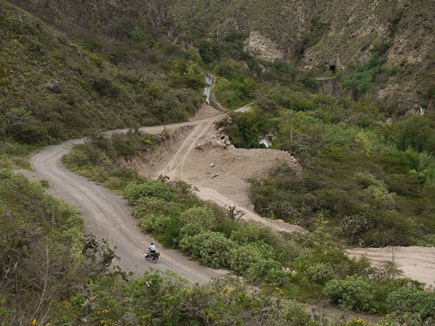
…which at first glance makes us think we've been a bit ambitious with our wanderings and we've hit a dead end. Beady eyed Jams spots an exit however and…
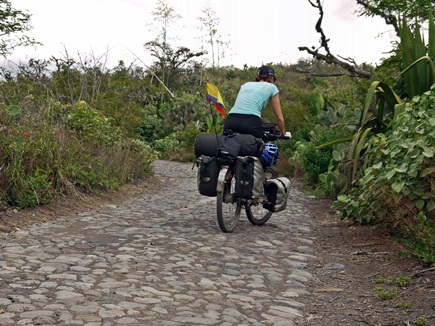
Throughout Central America, I wailed with discomfort whenever we reached a colonial town because it inevitably meant saddle-sore inducing cobbled streets. Imagine my dismay then at arriving in Ecuador to find that cobbled roads are not something reserved only for pretty towns here, but are seen as a legitimate road building technique. So it seems James will have to suffer much more of my complaining if all of the ascents ahead of us are to be cobbled.
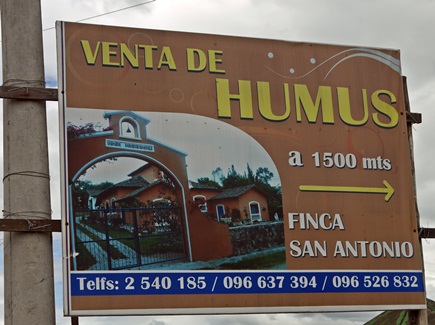
Excitement levels went up considerably when I saw this sign, thinking my favourite chickpea snack was for sale nearby…whilst I was salivating with anticipation, Jams helpfully pointed out that “humus” in this case is the Spanish word for soil…I know, I know, it's not even spelt the same way but after nearly two years of craving, you can't blame a girl for getting excited.
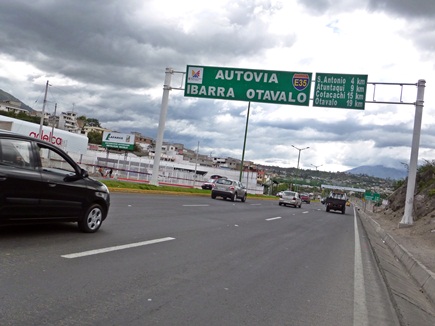
It couldn't have felt more different to our morning's ride when we hit the Pan American at Ibarra. From field tracks to four lane highway in just a few hours. Thankfully we only had to do 4km on this monstrosity before exiting again for a more peaceful route to Otavalo.
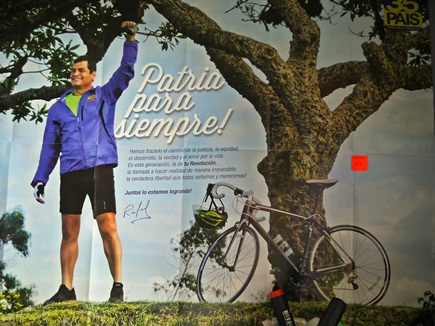
Along the way, we learned, from a helpful poster in a fruit and veg shop, that the current president of Ecuador, Rafael Correa, shares our passion for two wheels.
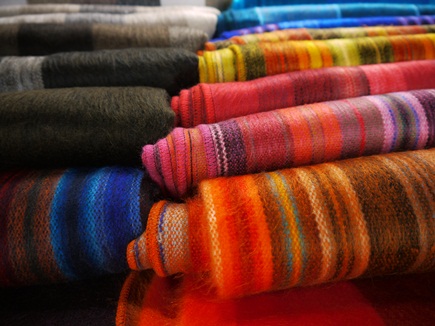
Ahead of us lie more mountains, greater altitude, more snow and colder weather than we will have experienced on this trip so far. We take the chance to stock up on woolly winter warmers in Otavalo, a town famous for a market selling deliciously snuggly clothing made from llama and alpaca wool.
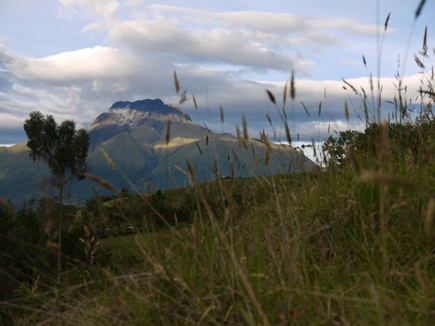
Another cobbled climb led us to a wonderful camping spot between two volcanoes. Looking right we had Imbabura standing majestically in the last of the evening light and…
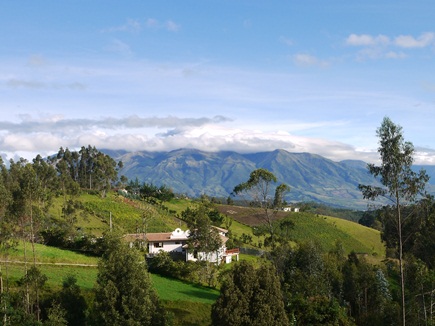
…looking left the summit of Cotacachi was shrouded in clouds but still there…looming from the other side. Ecuador, land of volcanoes.
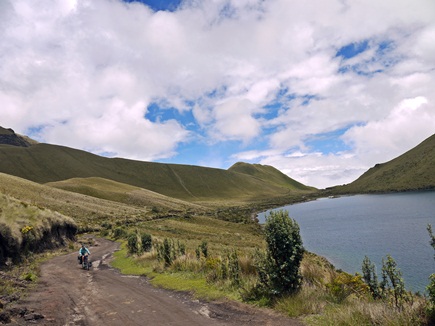
There are no pictures of our 14km cobbled climb up to the Lagunas de Mojanda, a series of lakes at 3700m, partly because it was extremely misty but also because it took every breath, every cell of the body to turn the pedals to get up there. We are definitely still adjusting to the altitude here, but it's all good training for when we expect to reach dizzy heights of 5000m in Bolivia. This was the first we saw of the lakes as we rounded the corner at the top of (what I thought was) the end of the climb.
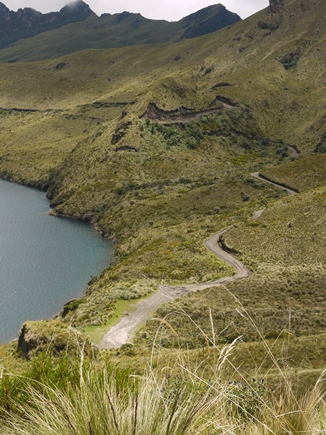
We had the place to ourselves and as the mist cleared and a deliciously warm sun showed itself, we followed the twisting path alongside these beautiful lakes.
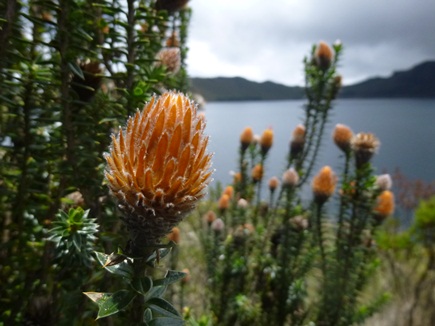
As with the páramo between Tulcán and El Angel, we were discovering stunning nature we'd never seen before. South America's version of thistles perhaps?
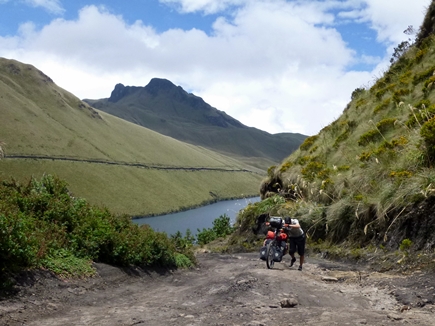
Rounding the lake, we were foolish to think the hard work was over and this steep section had us both off and pushing – we are thankful that we've got the weight of the bikes down as low as possible to be able to – just about – tackle tracks like this.
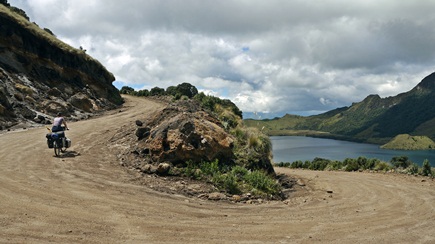
After lunch, sheltering out of the wind at an deserted tourist complex, the realisation slowly dawned on me that there was more climbing to come. If the lakes were in a basin, it was inevitable that we had to climb back out of it…steep grade on loose dirt after lunch…there was a lot of swearing. But at least the view was nice.
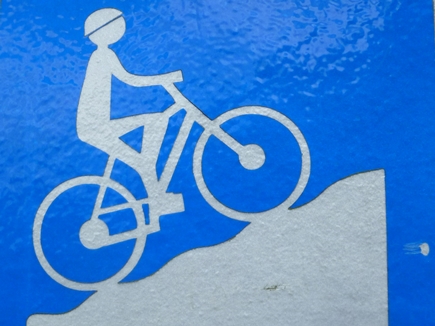
As I was choking to take in air when we got to the top, this sign managed to bring a grin to my face…a reminder, in case we needed it, that cyclists can expect steep climbs on uneven surfaces around here.
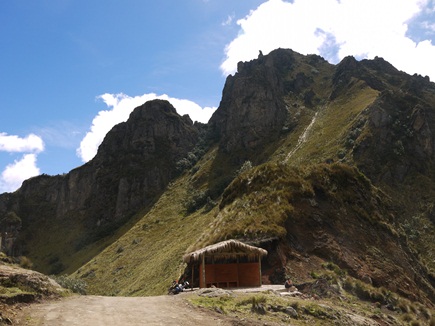
Finally we reach the top and at 4000m it's the highest climb of our trip so far. The rugged backdrop, fluffy white clouds and bright sunshine make it all seem worth it…
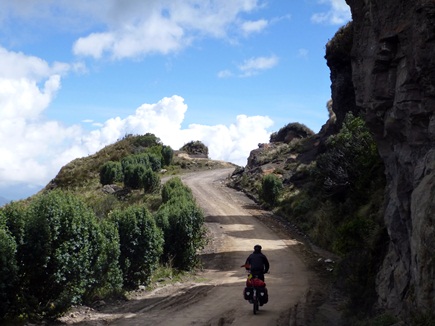
Setting out on the descent to Tabacundo, James looks as thought he's about to ride right off the edge and into the clouds.
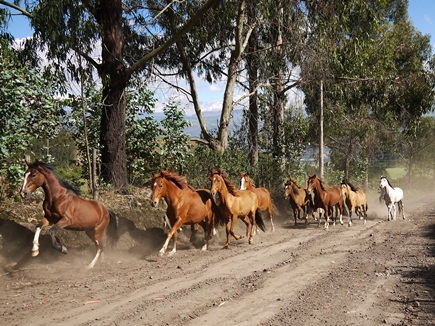
Halfway down the descent we are stopped in our tracks by a team of horses who demand all the space on the road as they gallop on by.
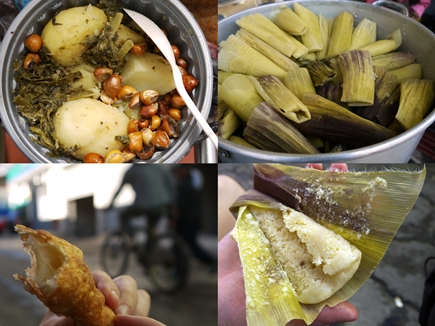
Arriving in Tabacundo, we decide it's time to try out some Ecuadorian snacks and we waste no time in ordering one of everything…so we can make some discerning choices of course. Clockwise from top left: potatoes with greens and toasted maize, wrapped humitas (maize dumplings with cheese and sugar), an unwrapped humita ready for eating and cheese empanadas…thankfully, everything was yummy and passed the test.
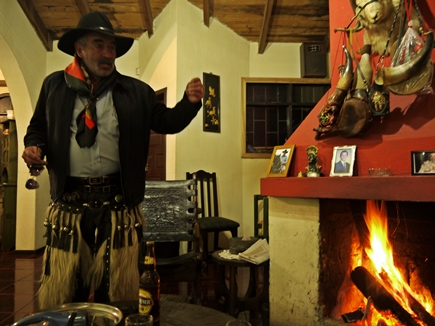
While I was stocking up with veg at the market, James was approached by Germán who runs a paintballing ranch just outside Tabacundo. He generously invited us to camp at his house where he and his wife Fabiola made us incredibly welcome. We were treated to an open fire, beer and delicious food, and even an exclusive performance of traditional costume and local dancing – usually only seen at the month long festival for St Peter and Paul held in June.
Snuggle up
March 31st, 2013
It’s been a chilly couple of weeks, mostly because we’ve been cycling around some of Ecuador’s highest points. Leaving the comfortable casa de ciclistas (and the perpetually generous Santiago and family) in Tumbaco near Quito felt like leaving a micro climate. Warm days – with sunshine and birdsong – and cool nights – perfect for sleeping in our tent in Santiago’s garage – gave way to snow-capped volcanoes and icy winds.
Climbing up to Volcán Cotopaxi and then up again to Lago Quilotoa had us digging out every scrap of warm clothing we’ve been carrying, and developing a new found respect for those who live their lives at high altitudes.
Sarah
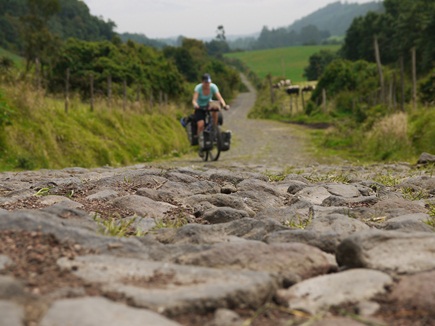
Cobbles keep you warm. A massive cobble sceptic, I found that they do have a benefit after all…tackling a 15km climb on cobbles definitely maintains a cosy body temperature.
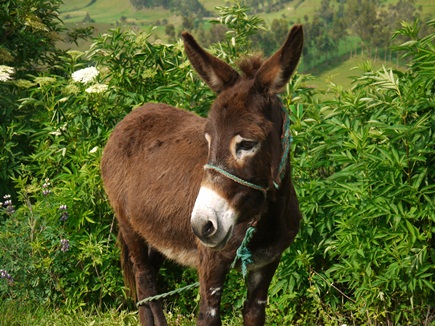
This donkey, just near volcano Cotopaxi, has just the right amount of snuggly fur to keep a smile on his face…ascending higher, the donkeys put on more fur, getting shaggier and hardier.
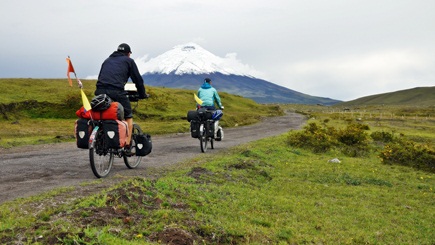
On the approach to Volcán Cotopaxi = layer up with all the clothes you've got and then sit back, pedal and enjoy the view. Riding your bike doesn't get much more spectacular than this.
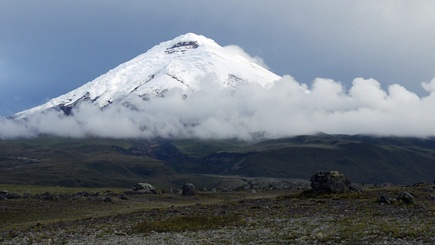
Determined to soak up this incredible view, we search around a boulder field for a good sized rock to shelter behind…
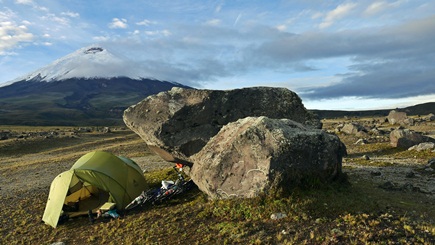
Not all of our campsites are as idyllic as this and we were so lucky that the volcano came out to play having been shrouded in cloud for most of the day.
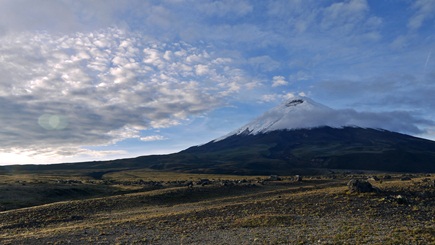
With just a few clouds and soft morning sunshine, Cotopaxi knows very well how to show off all of its 5897 metres.
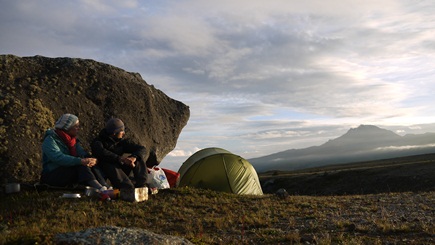
Never more grateful for our trusty little stove, we are making hot drinks throughout the day to keep warm. A shame then, that on this particularly crisp morning, we run out of fuel for our stove and have to abandon plans for coffee and porridge.
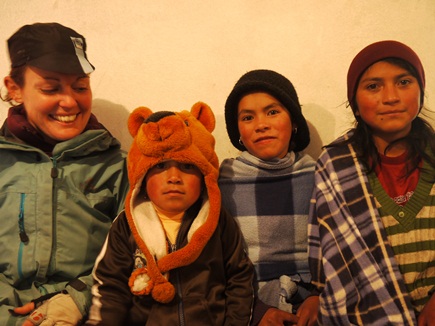
Arriving in the bleak little village of Yanaurcu Grande, we find Patricio pushing his five year old daughter home in a wheelbarrow. Everyone shelters together in his little shop from the miserable weather and then he kindly invites us to camp at his place across the square.
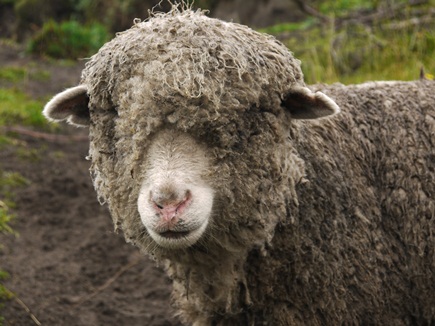
Not only bears trying to stay snuggly around here. The sheep in this neck of the woods have developed a dashing furry coat to keep the warm in and the chills out…quite how they manage to see anything is another story.
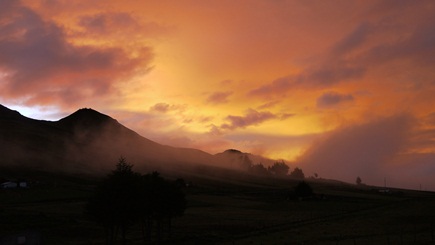
Camping in Patricio's sheltered yard is a blessing as the mist rolls in and the rain comes down; not before the day goes out with a spectacular sunset…
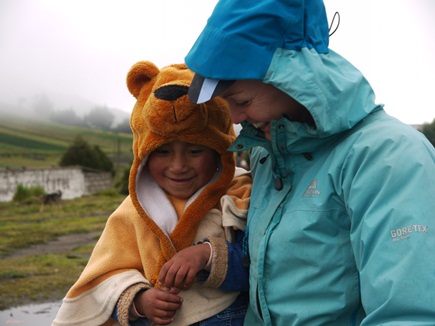
…and then an early morning farewell. Standing in the rain, with La Osita perched on my bike, we have a last minute giggle and wave goodbye before disappearing into the mist. The little bear is off to school and we are headed for the Quilotoa Loop, a series of roads taking us past Lago Quilotoa, a crater lake at 3800m.
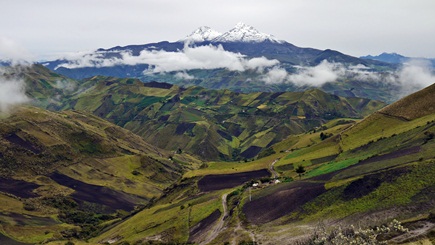
Climbing out of Yanaurcu Grande, another volcano comes into view. The snow covered twin peaks of Illiniza.
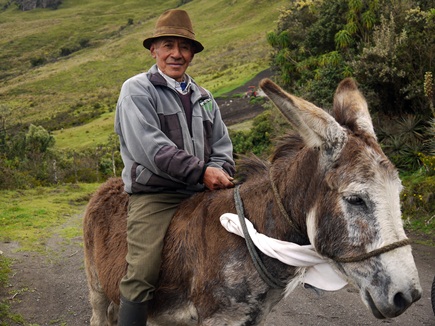
On a bitterly cold descent to the village of Isinliví, we meet Patricio's father coming towards us on his donkey. With only the traditional felt hat common in these parts and a fleece jacket to keep him warm, I am surprised he's not shivering away like us.
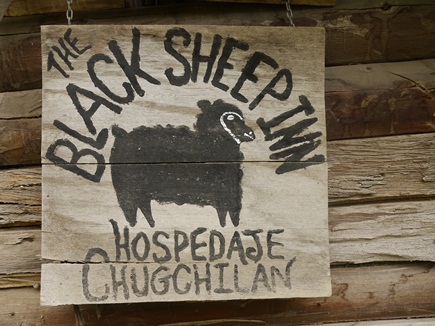
After a couple of nights camping in the cold, we're grateful to come indoors at Chugchilán. Thanks to a very generous gift from Raul & Lina in Medellín, we can splash out and spend a night at the lovely Black Sheep Inn…
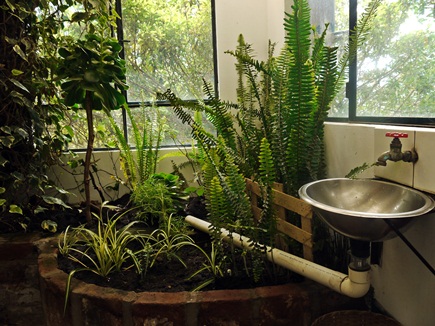
…where the eco-tourism credentials are impressive. Recycled rainwater feeds a living flower bed in the toilet…
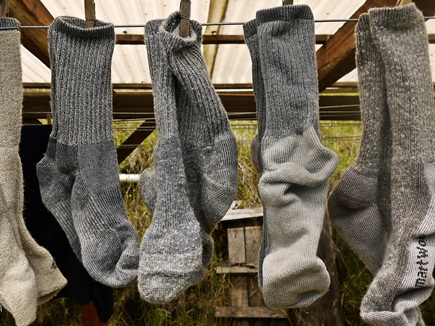
I am half tempted to pinch a pair of these snugglies while we are at the Black Sheep. My thick smart wool socks are currently my most prized possessions and seeing these beauties all lined up makes me crave a second pair.
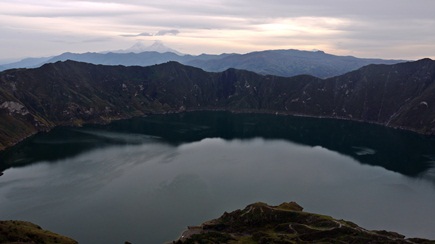
Half a day's climbing through ugly roadworks and in freezing rain brings us to the beautiful Lago Quilotoa. We're not lucky enough to see the famous turquoise colours in the water but we do catch it at sunrise the next morning with Illiniza lurking in the background.

We visit the colourful Saturday market in Zumbahua and take note of how the locals wrap up against the cold. I'm still not convinced that the trademark felt hats worn in these parts are enough to keep you warm but teamed with a colourful poncho and layers of blankets, they do look very fetching.
